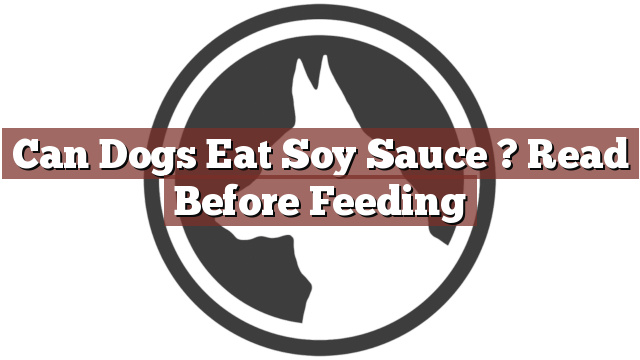Understanding Your Dog’s Dietary Needs
As a responsible pet owner, it is crucial to understand your dog’s dietary needs to ensure their overall health and well-being. Just like humans, dogs have specific nutritional requirements that must be met for them to thrive. Providing a balanced diet that includes all the essential nutrients is essential for their optimal growth and development. While it may be tempting to share your favorite foods with your furry friend, it is important to be cautious and informed about what is safe for them to consume.
Can Dogs Eat Soy Sauce? Read Before Feeding
Can dogs eat soy sauce? This is a common question that many dog owners may have. The answer is a resounding no. Soy sauce contains a high amount of sodium, which can be harmful to dogs when consumed in large quantities. Dogs have a different metabolism than humans, and their bodies are not designed to process excessive amounts of salt. Introducing soy sauce into your dog’s diet can lead to serious health issues such as sodium poisoning, kidney damage, or even death.
It is important to note that even a small amount of soy sauce can have adverse effects on your dog’s health. Therefore, it is best to avoid feeding them any foods that contain soy sauce or other high-sodium condiments.
Pros and Cons of Feeding Soy Sauce to Dogs
Pros of feeding soy sauce to dogs: None.
Cons of feeding soy sauce to dogs:
-
Sodium Poisoning: Soy sauce is extremely high in sodium, and excessive salt intake can lead to sodium poisoning in dogs. Symptoms of sodium poisoning include vomiting, diarrhea, excessive thirst, lethargy, tremors, seizures, and even coma.
-
Kidney Damage: The kidneys play a vital role in filtering waste and maintaining fluid balance in a dog’s body. A high-sodium diet, such as one that includes soy sauce, can put excessive strain on the kidneys and lead to kidney damage or failure over time.
-
Dehydration: Consuming high amounts of sodium can cause dogs to become dehydrated as their bodies try to eliminate the excess salt. This can lead to a variety of health issues and discomfort for your furry friend.
-
Digestive Upset: Introducing soy sauce into your dog’s diet can disrupt their digestive system, leading to gastrointestinal issues like stomach pain, nausea, and diarrhea.
In Conclusion: Making Informed Decisions for Your Dog’s Health
When it comes to your dog’s diet, it is essential to make informed decisions based on their specific nutritional needs. While soy sauce may be a common condiment in many households, it is not suitable for dogs due to its high sodium content. Feeding your dog soy sauce can lead to serious health problems, including sodium poisoning, kidney damage, and dehydration. It is best to stick to a balanced diet specifically formulated for dogs and avoid sharing human foods that may contain harmful ingredients. Always consult with your veterinarian regarding any questions or concerns about your dog’s diet to ensure their overall well-being.
Thank you for taking the time to read through our exploration of [page_title]. As every dog lover knows, our furry friends have unique dietary needs and responses, often varying from one canine to another. This is why it's paramount to approach any changes in their diet with caution and knowledge.
Before introducing any new treats or making alterations to your dog's diet based on our insights, it's crucial to consult with a veterinarian about [page_title]. Their expertise ensures that the choices you make are well-suited to your particular pet's health and well-being.
Even seemingly harmless foods can sometimes lead to allergic reactions or digestive issues, which is why monitoring your dog after introducing any new food item is essential.
The content provided here on [page_title] is crafted with care, thorough research, and a genuine love for dogs. Nevertheless, it serves as a general guideline and should not be considered a substitute for professional veterinary advice.
Always prioritize the expert insights of your veterinarian, and remember that the health and happiness of your furry companion come first.
May your journey with your pet continue to be filled with joy, love, and safe culinary adventures. Happy reading, and even happier snacking for your canine friend!

